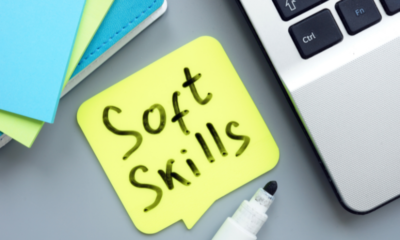Uncategorized
4 Pitfalls of Self-Confidence: Are You Blinded By It?
Published
2 years agoon

It was date night. A friend of mine stopped by our house with his girlfriend. And, while they were at dinner, they were debating a detail about one of their mother’s family recipes. The detail was something innocuous—a half-cup of sugar compared to third-cup, or fresh basil, verses fresh thyme. The fact that this minor detail had become a debate was ultimately silly, however, at least for my friend, it was fringing on becoming an argument.
While my friend cornered me to tell me how confident he was in his argument, his girlfriend chatted happily with my wife about a series they had both binge-watched.
Picture this for a second. My corner was a heated topic. My wife’s corner was pleasant.
As my friend continued to rant about how he would prove his girlfriend wrong, I attempted to eves-drop on my wife’s conversation. And, I quickly assessed that my friend’s girlfriend had zero heat in the conversation.
“I can’t wait to get home and prove her wrong,” said my friend.
I paused. “This is your date night?” I asked.
“Yes,” he responded.
“This is the night you both dedicated to romance, celebrating your relationship, and the stuff that goes with it?”
“What’s your point?” asked my friend.
“Don’t you think racing home to prove your girlfriend wrong will kill the romantic mood?” I paused again. “And, would you rather be right, or romantic?”
My friend immediately understood my point. He was blinded by own self-confidence—the notion he was sure about a random ingredient.
Okay, so you might be thinking, “But self-confidence is good, right?”
It is. In fact, self-confidence is critical to your own success, and it’s often difficult achieve. Self-confidence is a feeling of trust in your own abilities and judgement. You need self-confidence when you apply for a school, or a job. You need it to ask someone on a date, complete a project, or compete in an athletic event. In fact, you need confidence in your abilities and judgement in almost every aspect of life. However, self-confidence without self-esteem (confidence in your own worth, or self-respect) can be blinding to many individuals, as it was my friend. He, for some reason, felt threatened that his girlfriend disagreed with him.
When self-confidence and self-esteem aren’t aligned, you can experience numerous pitfalls. Here are four pitfalls to consider when the two aren’t aligned.
1. Others Don’t See You.
This might sound contradictory; however, this is important to consider. While my friend was self-confident about his ability to recall ingredients, and he may have been right, his girlfriend, as well as myself, didn’t see the person he wanted us to see, or needed us to see. His self-confidence simply made him appear to be a jerk. This is what we often define as arrogance.2. You Don’t See Others.
We’ve all known that person who nods while we speak simply because they want to say something that “one-ups” our point. And, when we meet these people, we feel invisible, because they didn’t care about what we had to say. They didn’t see us. Self-Confidence, without the Self-Esteem to be stable enough understand that none of us knows everything can lead to a life where some people never truly get to know others, or ever learn from others.3. You Don’t See Room for Improvement.
A high level of self-confidence, and the belief in your own abilities, is crucial to your future success. However, when self-confidence is never challenged, it can lead to stagnancy. Consider a runner who easily wins every race. They will most likely possess a high level of self-confidence. However, will that self-confidence ever lead to complacency—the desire to improve themselves, as opposed to simply the desire to win the race. People who live in this world are often crushed when someone finally challenges their abilities because they never learned how to continuously improve.4.Improvement Doesn’t Have Room for You.
Self-confidence is often a product of past results. This means, we gained our self-confidence by the successes we’ve already earned. However, sometimes the world around us can improve faster than we can improve. If we don’t improve with it, and adapt to it, our achievements become outdated and stale. It may sound harsh, but success ends the moment you quit succeeding.How do you align self-confidence and self-esteem?
Although the concepts of self-confidence and self-esteem are closely related, the alignment of the two concepts is critically important for both your success, and your fulfillment in life. How do you align the two? In researching for this post, I discovered an amazing online course that not only defines the two concepts, but also discusses self-efficacy. It’s well worth the click—because if you can master and understand these concepts, your potential will increase dramatically.
More From Bon Voyaged
-


The Funniest Airport Welcome Home Signs
-


7 Must-See Sculptures Around the Globe
-
Ironic, Clever, And Hilarious Answers To Test Questions
-


4 Surefire Ways to Combat “Auto-Pilot” Mode in 2022
-


Wild Australian Photos
-


Incredibly Timed Sports Photos
-


5 Soft Skills Employers Are Looking For In 2022
-
Beauty Buys To Help You De-Stress
-


Bad Year? 10 Simple Ways to Bounce Back Mindfully
-


Shaq’s Impressive Endorsement Resume
-


Does Happiness Matter? 4 Truths That Might Change Your Mind
-


Star Wars Behind-The-Scenes Photos

